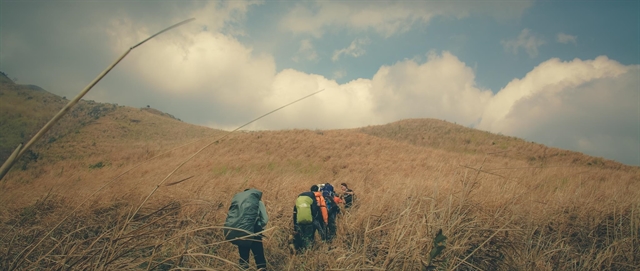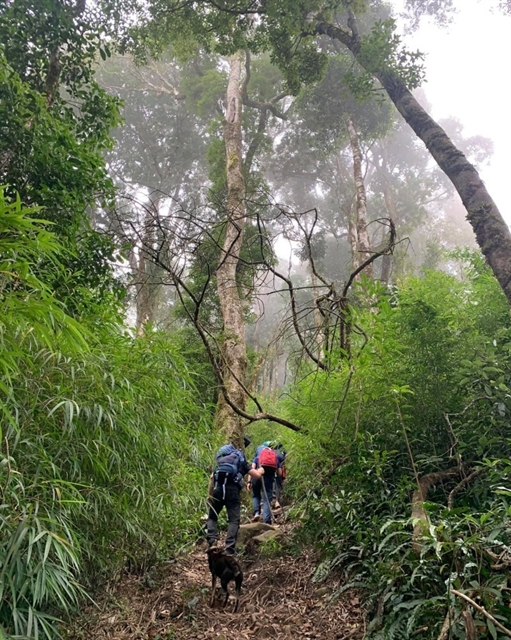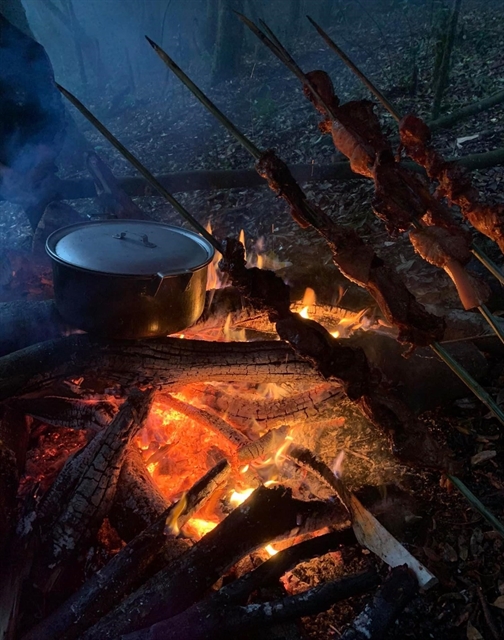 Life & Style
Life & Style


|
| Checking in the Lùng Cúng mountain peak. — Photo didulich.net |
Lâm Thanh
With an altitude of more than 2,900m, Lùng Cúng is in one of the most beautiful mountains in Việt Nam. The top of the mountain is covered by clouds year-round, which tourists love to snap photos of.
Lùng Cúng is named after a village located deep in the most rugged mountains in Nậm Có Commune, Mù Cang Chải District in Yên Bái Province. The beautiful trekking route is a harmonious picture of green grass hills, white reeds, vast primaeval forests, and terraced rice fields.
It's about 250km from central Hà Nội to Lùng Cúng. We took a car from Hà Nội to Yên Bái, then rented motorbikes to travel between the villages of Mù Cang Chải District. Because of the mountainous terrain, we rented motorbikes instead of scooters.
Before going to the top of Lùng Cúng, we stopped at Tu San Village, where many Thái and Kinh people live. The road to Tu San was muddy with high and narrow slopes but we were still determined to reach the village to conquer the beautiful mountain.
Tu San Village possesses many diverse cultural features, thanks to the combination of architecture, cuisine and living habits of the people.
There are several ways to reach the top of Lùng Cúng Mountain, but many people say trekking from Tu San Village is the best. This road has a diverse terrain with green grass hills, a mysterious jungle and a beautiful bamboo forest. Each layer of vegetation offers beautiful landscapes, making the trek less strenuous.

|
| Tourists conquer Lùng Cúng mountain peak from Tu San village. — Photo tripnow.vn |
After leaving Tu San Village in the thick fog, we got lost in the vast reed fields, fluttering in the wind. In the distance, clouds were rising. Through the white reed fields, we entered a forest in which old trees covered the sky, making the forest seem dark.
It seemed that we were going through the primaeval forest with the most beautiful scenery. The forest has large, mossy, flat rocks as well as many streams and waterfalls. Going a little further, we saw unique vegetation with bamboo intermixed. The further we went, the more the small trees intertwined.
Near the top of the mountain are fields of white flowers. It was still sunny in the afternoon, but it was very cold because of the wind. Crossing the carpet of white flowers, we stopped to determine what way to go. Perhaps the distant peak was Lùng Cúng. The wind was getting stronger and stronger and we floundered when walking on the yellow and brown grass fields due to the strong wind.
We clung tightly to the trees on the hillside and continued walking. The sky was getting bluer. Clouds rolled and drifted fast. These beautiful moments of nature made our footprints stronger.
We walked along the abysses with high winds and passed white flower slopes dyed by the sun.

|
| Tourists trek through the primeval forest in Tu San village to reach Lùng Cúng mountain peak. — Photo du-lich.net |
We were very excited when the landmark of 2,913 metres above sea level at the top of Lùng Cúng appeared.
This mountain top has a wide surface and open space, like a football field on the top of a mountain. In the distance, a sea of white clouds was covering Lùng Cúng Village. The scene was so magical. At that moment, each person in a corner, stood still to enjoy nature's gift to us.
We brought tents to camp on Lùng Cúng. The feeling of lighting a fire to warm up on a mountain top nearly 3,000m high and waking up early to see the sunrise was wonderful.

|
| Lighting fire on the Lùng Cúng mountain peak. — Photo du-lich.net |
Tourism potential
In recent years, Lùng Cúng villagers have created tourist routes and guided tourists to climb the mountain, giving them extra income. However, these efforts are largely disorganised.
"Lùng Cúng has many beautiful spots with many kinds of flowers. Recently, many tourists have wanted to come here, but the unfavourable roads are also a barrier for people in the village who want to develop the economy and promote tourism.
"We hope that authorities will invest facilities from the commune centre to the village for convenient travel," said Giàng A Sang, a resident of Lùng Cúng Village.
At present, Lùng Cúng villagers manage and protect 1,798ha of forest. On average, each household is taking care of 200 perennial jujube trees of the Mông people and hundreds of peach trees, giving an average income of VNĐ100-150million (US$4,200-$6,300) per year. VNS




